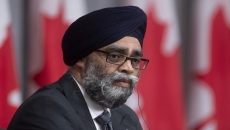The new federal taxpayers' advocate says he plans to keep a close eye on how the Canada Revenue Agency treats Canadians feeling the financial pain from the COVID-19 pandemic.
François Boileau said in an interview with The Canadian Press the CRA has agreed to be understanding with Canadians as the agency shifts back to tax-collection mode after months of focusing on doling out emergency aid.
He also said he plans to reach out to marginalized people who may feel too intimidated to even engage with the CRA on tax issues.
"There will be more families and more individuals and small enterprises — taxpayers, in one word — that will feel some pressure and therefore we may receive more complaints in regards to that," Boileau said in a recent interview.
"I've been assured that they (CRA) will be very empathic to the clientele, they will listen to the plight of ordinary Canadians and while asking them for collection. But we'll see how it's done."
Boileau took over the role of ombudsperson at the start of the month after more than a decade as Ontario's French-language services commissioner. He is the third person to hold the job, succeeding Sherra Profit.
He also inherits some ongoing reviews Profit started, including how the way the Canada Revenue Agency administers the Canada Child Benefit has caused problems, including for single mothers.
"I love the independence. I love to be apolitical," Boileau said about why he applied for the job. "I love the fact that we have a duty to be impartial, to be fair, and to make sure that fairness is actually a characteristic that is not ignored by CRA now."
Profit's final report, released in late August, detailed some of her concerns about maintaining that independence. The ombudsperson was created by a cabinet decision known as an order-in-council, which labelled the position as a special adviser to the revenue minister.
Profit wrote that formal link "impedes the true exercise of independence" by the watchdog. She also argued for a larger budget so the office could effectively do its job, or allow it and other ombudspersons to come together under one roof and manage resources together, independent of government influence.
Her report also noted that complaint levels in the fiscal year that ended in March had fallen after two consecutive years of record highs, with complaints often focused on perceived lack of fairness, delays in processing or lack of clarity.
So far, Boileau said, the pandemic hasn't harmed his office's ability to respond to complaints from people who believe they have been treated unfairly by federal tax officials.
Officials who handle complaints are able to work remotely now after focusing on critical services early in the pandemic.
"We have an intake process that is in place and no one misses a call," Boileau said.
"There's no gap for people that want to communicate with us, either on the phone or online."





